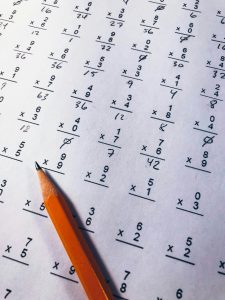Printable Math Puzzles: Ready-to-Use Resources for Parents

Searching for innovative ways to enhance your child’s mathematical skills can be a rewarding journey toward their academic success. Want to make learning both fun and engaging for your little one? Look no further—printable math puzzles are ready-to-use tools that can transform how your child approaches mathematics! These puzzles not only reinforce mathematical concepts but also enhance critical thinking and problem-solving skills.
In this article, we will explore different types of printable math puzzles and provide valuable tips on how to effectively incorporate them into your child’s daily routine. Let’s dive in!
Crossword Puzzles: Enhancing Vocabulary and Understanding
Crossword puzzles are an excellent way to engage children in learning while reinforcing their vocabulary and understanding of mathematical terms. These puzzles challenge children to fill in words related to mathematical concepts based on given clues. Websites like Math in English offer a variety of printable math crossword puzzles suitable for different age groups.
By solving crossword puzzles, children not only expand their mathematical vocabulary but also develop better comprehension of mathematical terms. It encourages active recall, as they retrieve the correct word from memory based on the given clue. This helps reinforce knowledge and improve retention.
Additionally, crossword puzzles make learning interactive and enjoyable. Children can work on these puzzles independently or in a group setting, which enhances their social skills and promotes collaborative learning. The satisfaction of completing a crossword puzzle boosts confidence and motivates them to tackle more challenging tasks.
Sudoku: Promoting Logic and Number Recognition
Sudoku puzzles are a popular choice when it comes to printable math puzzles. These puzzles require players to fill a grid with numbers so that each row, column, and section contains all digits without repetition. Sudoku promotes logical reasoning and number recognition, making it an excellent tool for developing critical thinking skills.
For beginners, smaller grids, such as 4×4 or 6×6, are ideal. Gradually, children can progress to standard 9×9 grids as their skills improve. This allows them to build confidence and tackle more complex puzzles at their own pace.
Sudoku puzzles require analyzing patterns, making logical deductions, and thinking strategically. These exercises improve problem-solving abilities by breaking down larger problems into simpler steps. Sudoku also fosters patience and perseverance, as children often experiment with different combinations before finding the solution.
Logic Puzzles: Enhancing Critical Thinking Skills
Logic puzzles challenge students to solve problems based on a set of conditions or clues. These printable puzzles encourage critical thinking and require children to use deductive reasoning to arrive at the correct solution.
Websites like Education.com provide a range of logic puzzles tailored to various age levels. These puzzles can be customized according to a child’s skill level, ensuring an appropriate challenge without overwhelming them.
By solving logic puzzles, children develop skills like analyzing information, making connections, and drawing conclusions. These abilities not only support academic success but also have practical, real-world applications.
Logic puzzles can be solved individually or collaboratively. Group-solving fosters teamwork, communication, and creativity. It creates a supportive learning environment where children learn from each other’s perspectives.
Word Problems: Applying Math to Real-World Situations
Word problems make math relevant by applying concepts to real-world scenarios. They require reading comprehension and problem-solving skills, allowing children to practice math in practical contexts.
Worksheets from platforms like Teach-nology offer diverse word problems that challenge kids to analyze information and use appropriate mathematical operations. This approach fosters critical thinking and enhances reading skills, as children must grasp problem statements and extract essential details to find solutions. Overall, it deepens their understanding of math and its applications.
Number Puzzles: Improving Calculation Skills
Number puzzles sharpen calculation skills and develop number sense. These include fill-in-the-blank exercises where children complete sequences or equations using their number knowledge.
Resources like Math Salamanders offer a variety of number puzzles for different skill levels. These puzzles encourage children to explore number patterns, operations, and relationships.
By solving number puzzles, children improve mental math skills and gain confidence in handling numbers. They learn how numbers interconnect and develop a deeper understanding of mathematical operations.
By solving number puzzles, children can strengthen their mental math abilities, which enhances their overall number sense and helps them perform calculations more quickly and accurately.
Kakuro and KenKen: Encouraging Addition Skills and Logical Thinking
Kakuro and KenKen puzzles combine arithmetic operations with logic. Kakuro involves filling grids based on sum clues, while KenKen uses operations like addition or multiplication to reach target values.
These puzzles challenge children to think strategically and apply arithmetic skills. They promote logical thinking by encouraging children to analyze relationships between numbers.
Educational websites offer Kakuro and KenKen puzzles at various difficulty levels. Gradual progression helps children build skills over time.
Magic Squares: Promoting Strategic Thinking
Magic squares involve arranging numbers in a grid so that each row, column, and diagonal has equal sums. This type of puzzle promotes strategic thinking and understanding of number properties.
By solving magic square puzzles, children develop problem-solving skills and gain insights into factors, multiples, and symmetry. These exercises also require logical deductions, helping enhance critical thinking.
Seasonal-Themed Puzzles: Making Math Relevant and Engaging
Seasonal-themed puzzles connect math challenges to holidays or seasons, making learning engaging. For instance, Halloween puzzles may involve counting spiders, while Christmas puzzles focus on solving equations with festive themes.
Many websites offer seasonal worksheets, allowing children to explore math topics in a fun and festive way. Incorporating such puzzles into learning routines captures children’s interest and keeps them motivated.
Printable Math Puzzles at a Glance
|
Puzzle Type |
Key Benefit |
Example Resource |
|---|---|---|
|
Crossword Puzzles |
Vocabulary and term comprehension |
Math in English |
|
Sudoku |
Logical reasoning and number sense |
Printable Sudoku websites |
|
Logic Puzzles |
Critical thinking and collaboration |
|
|
Word Problems |
Real-world application of math |
Teach-nology |
|
Number Puzzles |
Calculation skills and mental math |
Math Salamanders |
|
Kakuro and KenKen |
Arithmetic and logical thinking |
KenKen online puzzle platforms |
|
Magic Squares |
Strategic thinking and number sense |
Educational printables |
|
Seasonal Themed Puzzles |
Relatable and engaging math learning |
Festive math worksheet websites |
Conclusion:
Printable math puzzles are versatile tools for transforming your child’s learning experience. By integrating puzzles like crossword puzzles, Sudoku, logic puzzles, word problems, and others, you can foster critical thinking, problem-solving, and a love for mathematics.
Embrace printable math puzzles today and watch your child unlock their full potential while enjoying the journey of learning! For a more comprehensive approach to skill development, consider exploring SIP Abacus courses, which combine innovative methods with a proven curriculum to further enhance your child’s mathematical and cognitive abilities. Visit SIP Abacus Courses today and discover the perfect program to boost your child’s learning progress!



